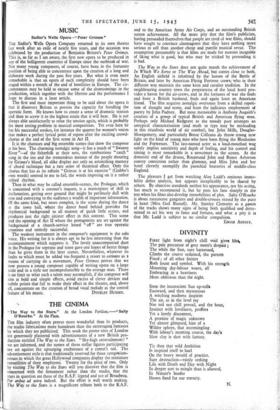Sadler's Wells Opera—" Peter Grimes"
• MUSIC
THE Sadler's Wells Opera Company returned to its own theatre last week after an exile of nearly five years, and the occasion was celebrated by the production of Benjamin• Britten's Peter Grimes. This is, so far as I am aware, the first new opera to be produced in any of the belligerent countries of Europe since the outbreak of war. Not many young composers, of course, have been in the fortunate position of being able to concentrate upon the creation of a long and elaborate work during the past five years. But what is even more remarkable is that an opera of such complexity should have been staged within a month of the end of hostilities in Europe. The cir- cumstances may be held to excuse some of the shortcomings in the production, which together with the libretto and the performance I hope to discuss in a later article.
The first and most important thing to be said about the opera is that it discovers Britten to possess the capacity for handling the operatic form. He knows how to create a sense of dramatic tension and then to screw it to the highest strain that it will bear. He is not always able satisfactorily to relax the tension again, which is probably the most testing problem in musical composition. Yet even here he has his successful strokes, for instance the quartet for women's voices that makes a perfect lyrical point of repose after the exciting crowd- chorus at the end of the first scene in Act II.
It is the choruses and big ensemble scenes that show the composer at his best. The charming nostalgic song—it has a touch of " Swanee River "—of the fisherfolk at their nets, the rumbustious " catch " sung in the inn and the tremendous menace of the people shouting for Grimes's blood, all alike display not only an astonishing mastery of choral technique but a rare sense of theatrical effect. Only the chorus that has as its refrain "Grimes is at his exercise" (Crabbe's own words) seemed to me to fail, the words imposing on it a rather stilted rhythm. Then in what may be called ensemble-scenes, the Prologue, which is concerned with a coroner's inquest, is a masterpiece of skill in declamation, getting over ground that might be perilously dull with ease and conveying to the audience a wealth of important information. Of the same kind, but more complex, is the scene during the dance in the town hall, where the dance band behind provides the rhythmical background to all manner of quick little scenes, and produces just the right sinister effect in this context. This scene and the opening of Act II where the protagonists are set against the background of a church-service heard " off " are true operatic creations and entirely successful. The weakest instrument in the composer's equipment is the solo voice. His writing for it is always apt to be less interesting than the accompaniment which supports it. The lovely unaccompanied duet in the Prologue for soprano and tenor gave one hopes of better things than he gives them in the later scenes. Nevertheless, whatever its faults to which must be added too frequent a resort to ostinato as a means of carrying on a movement, Peter Grimes proves that we now possess a young composer capable of writing opera on a large scale and in a style not incomprehensible to the average man. There is no limit to what such a talent may accomplish, if the composer will aim at bold and simple effects, avoid excess of clever devices and subtle points that fail to make their effect in the theatre, and, above all, concentrate on the creation of broad vocal melody as the central


























 Previous page
Previous page